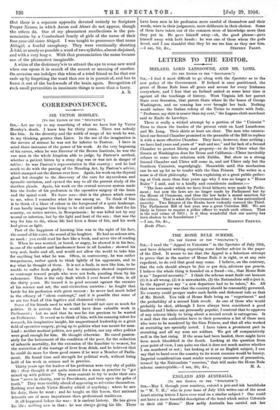CORRESPONDENCE.
SIR VICTOR HORSLEY.
[TO THE EDITOR OF THE " SPECTATOR."'
Gm,—Let me try to say something of what we have lost by Victor Horsley's death. I knew him for thirty years. There was nobody like him. In the diversity and the width of range of his work he was, to my thinking, greater than Lister. In the use of the imagination in the service of science ho was not far inferior to Pasteur. I have in mind three instances of the power of his work. At the very beginning of his career, when he was Director of the Brown Institute, he was the one man in the whole kingdom able to judge, by Pasteur's method, whether a patient bitten by a stray dog was or was not in danger of rabies : he was Pasteur's representative in this country : and ho had much to do with the passing of the Muzzling Act, by Pasteur's advice, which stamped out the disease over here. Again, his work on the thyroid gland led straight to the discovery of the cure for myxoedema and sporadic cretinism, and opened the way to all the present study of the ductless glands. Again, his work on the central nervous system made him the leader of his profession in the operative surgery of the brain and the spinal cord. We lesser men—that is the phrase which comes to me, when I remember what ho was among us. To think of him is to think of a blaze of colour in the foreground of a quiet landscape. I can hardly imagine him living to be old and infirm. Ho died for his country, on active service, in Mesopotamia : he was killed not by any wound or infection, but by the light and heat of the sun : that was the way for Min to die, whose life had been a flame of fire, and his work had given us light.
Part of the happiness of knowing him was in the sight of his face, the sound of his voice, the sound of his laughter. Ho had no solemn airs, no mask : you could read his face like a book, and never tire of reading it. When he was worried, or bored, or angry, he showed it in his face, in one of the noblest and •handsomestfaces in all London : showed his very soul, faults and all, and would not allow the world to take him for anything but what he was. Often, in controversy, he was rather tempestuous, rather quick to think lightly of his opponents, and to lay what he thought of them. It is not a fault, in men like him, to be unable to suffer fools gladly ; but he sometimes showed impatience or contempt toward people who were not fools, puzzling them by his vehemence. That is the only fault which I ever heard of him, in all the thirty years. He turned it to good account against the enemies of his science and art, the anti-vivisection societies : he fought that battle for his profession with great success : ho never had much belief in the efficacy of " silent contempt," and it is possible that some of us are too fond of this fugitive and cloistered virtue.
Some of his friends used to wish that he would not care so much for politics. It is certain that he would have done valuable work in Parliament ; but we said that he was far too precious to be wasted en Parliament. It vexed us to think of him, with his amazing talent for research, his imaginative insight, his unquestioned leadership in a great field of operative surgery, giving up to politica what was meant for man- kind : neither medical polities, nor party politica, nor any other politics were good enough for him. He thought otherwise. He cared passion- ately for the betterment of the condition of the poor, for the reduction of infantile mortality, for the extension of the franchise to women, for the restriction of the wastage of lives from drink, and he believed that he could do more for these good causes if he were a Member of Parlia- ment. He found time and strength for political work, without losing hold of his work in science and in practice.
Thirty years ago the leaders of his profession were very shy of public life : they thought it not quite correct for a man in practice to " get mixed up with politics." They were content to try to make their own lives " move in charity, rest in Providence, and turn upon the poles of truth." They were terribly afraid of appearing to advertise themselves. Nothing ever made Victor Horsley afraid of anything : where he saw his duty, there he went : and he taught us this lesson, that national interests are of more importance than professional traditions.
It all happened before the war : it is ancient history. Ho has given his life : nothing new in that : he was always giving his life. There
have been men in his profession more careful of themselves and their words, wiser in their judgments, more deliberate in their choices. Some of them have taken out of the common store of knowledge more than they put in. He gave himself away—oh, the good phrase—gave himself away with both hands : he was one of those whom the gods loved, and I am thankful that they let me see him as they saw him.






























 Previous page
Previous page